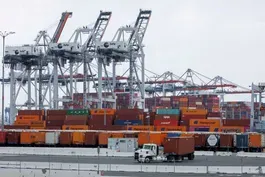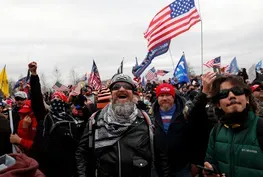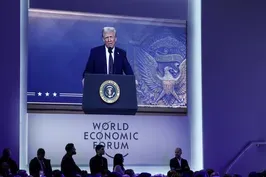
Judge blocks Trump's order ending birthright citizenship
Clip: 1/23/2025 | 6m 30sVideo has Closed Captions
Federal judge puts blocks on Trump's order to end birthright citizenship
A federal judge temporarily blocked President Trump’s executive order to end birthright citizenship, the first legal test for his flurry of immigration actions. Birthright citizenship was enshrined in the Constitution in 1868 and upheld by the Supreme Court in 1898. Washington is one of 22 states suing Trump over his order. State Attorney General Nick Brown joined Amna Nawaz to discuss more.
Major corporate funding for the PBS News Hour is provided by BDO, BNSF, Consumer Cellular, American Cruise Lines, and Raymond James. Funding for the PBS NewsHour Weekend is provided by...

Judge blocks Trump's order ending birthright citizenship
Clip: 1/23/2025 | 6m 30sVideo has Closed Captions
A federal judge temporarily blocked President Trump’s executive order to end birthright citizenship, the first legal test for his flurry of immigration actions. Birthright citizenship was enshrined in the Constitution in 1868 and upheld by the Supreme Court in 1898. Washington is one of 22 states suing Trump over his order. State Attorney General Nick Brown joined Amna Nawaz to discuss more.
How to Watch PBS News Hour
PBS News Hour is available to stream on pbs.org and the free PBS App, available on iPhone, Apple TV, Android TV, Android smartphones, Amazon Fire TV, Amazon Fire Tablet, Roku, Samsung Smart TV, and Vizio.
Providing Support for PBS.org
Learn Moreabout PBS online sponsorshipAMNA NAWAZ: As we have reported, a federal judge today temporarily blocked President Trump's executive order to end birthright citizenship, the first legal test for the president amid his flurry of week one immigration actions.
Birthright citizenship was enshrined in the Constitution in 1868 and upheld in a landmark Supreme Court ruling in 1898 in the case of a young Chinese American cook named Wong Kim Ark.
Today, nearly two dozen states are suing President Trump over his order to end it.
Washington state is one of them.
And Attorney General Nick Brown joins me now.
Attorney General Brown, welcome to the "News Hour."
Thanks for joining us.
NICK BROWN, Washington Attorney General: Thank you for having me.
AMNA NAWAZ: So let's begin with that news today of the federal judge in Seattle temporarily blocking President Trump's executive order and calling it blatantly unconstitutional.
What's your reaction to that ruling?
NICK BROWN: Well, we're obviously very happy with the judge's ruling today.
Washington brought a case, along with Arizona, Oregon, and Illinois, to challenge that executive order.
We brought a complaint and temporary restraining order.
And to hear the judge from the bench say today that it was blatantly unconstitutional, to say that in his four decades since being appointed by President Reagan that he has never seen something so obviously illegal was very heartening and reaffirmed that we need to protect and defend the Constitution of the United States.
And it's the first step of many to come, but really happy with the team's effort and the collaboration with other attorney generals.
AMNA NAWAZ: Do you take today's ruling as any kind of indication of what could come in your case?
NICK BROWN: Well, we have certainly got a long way to go.
This is only a temporary restraining order, but it has really important impact.
Effectively, nationwide, the Department of Justice and many other agencies in the federal government are ordered to put their pens down and cannot take any action from enforcing or implementing this executive order.
So they have to stop.
AMNA NAWAZ: Well, the clause at the heart of all this is something that's enshrined in the 14th Amendment of the U.S. Constitution.
It reads this way.
It says: "All persons born or naturalized in the United States and subject to the jurisdiction thereof are citizens of the United States."
Now, as you have seen, this Trump administration is arguing that people born to parents in this country illegally have always been excluded from this because, as they argue, they are not subject to the jurisdiction of the United States.
Why, in your view, is that legally wrong?
NICK BROWN: Well, their argument is really a fringe theory that is not well supported and has been sort of an outlier in the common understanding of the 14th Amendment, in part because the Supreme Court ruled on this matter in the case that you referenced earlier.
And this has been the common understanding of our Supreme Court, of Congress, of every prior president up until Donald Trump.
This is the understanding of what it means to be an American, that, if you're born here in this country, that you are an American.
The provision about subject to the laws thereof has really been used, tried to be manipulated to change that common understanding.
And the judge today in our court really got to the heart of it.
Essentially, what the United States is arguing, if you take their argument to its fullest extent, is that people born to undocumented people in the United States would not be subject to the laws and jurisdiction of the United States.
So, if an undocumented person was charged with a crime, they wouldn't be subject to the jurisdiction of this state.
And it's just kind of an absurd legal theory.
I understand the Trump administration will continue to advance that one, but we feel really confident in the legal precedent and this own Supreme Court's ruling that we will be affirmed all the way up the chain.
AMNA NAWAZ: It's worth pointing out too it wouldn't just impact children born to undocumented residents.
It's also children born to some people who are here with temporary legal status of some kind, on student visas or tourists or on temporary protected status.
Have you taken stock?
Do you know how many people could be impacted in your state or across the country?
NICK BROWN: Well, we think, in every given year, there's approximately about 7,000 people who this might impact.
And, across the country, we're talking in the hundreds of thousands.
And it has a direct impact on those individuals, really attempting to erase their citizenship, their identity.
It really leaves them in this uncertain place of perhaps not being a citizen of any country.
And we could not stand that.
It also has a direct impact on states specifically who are responsible for the well-being of people in their state and the financial obligation that Washington and other states across the country would face if the federal government stepped out of their co-responsibility would be significant.
I also think it's really important that people understand where this provision of the 14th Amendment came from.
It came in the wake of perhaps the most infamous Supreme Court decision in United States history, the Dred Scott decision in 1857.
And the 14th Amendment reaffirmed that people here in this United States that are born in this United States are Americans.
And, initially, it was brought forth to defend newly freed Black Americans.
And that has been the understanding of this country for so long.
And there are many countries in the world that have some version of birthright citizenship.
I have seen the president time and time again say, we're the only country in the world that does that.
He's wrong, like he's wrong about so many things.
And we need to defend the Constitution of the United States.
And that's what this case and the other cases are trying to do.
AMNA NAWAZ: Even if this does not succeed in the courts for the Trump administration, I wonder what you think about just the fact that this is now a conversation that's being had, that courts are forced to contend with it, you and other states are forced to legally defend it.
Does all of that have some kind of an impact?
NICK BROWN: Our hope is that we don't have to spend so much energy and resources focused on this type of work.
But it is very important to defend everyone in our states, defend their right to be an American.
And so we will take every action by the president as it comes, do our own analysis and evaluation.
But we have so many things that we do on behalf of the people of our states that have nothing to do with Donald Trump.
And we continue to do the day-to-day work in these agencies.
But we cannot be dissuaded or deterred by illegal and unjust and, frankly, un-American actions by the president of the United States.
AMNA NAWAZ: That's the attorney general of Washington state, Nick Brown, joining us tonight.
Attorney General Brown, thank you.
It was good to speak with you.
NICK BROWN: Thank you very much.
I appreciate it.
How global business leaders are responding to tariff threats
Video has Closed Captions
How global business leaders are responding to Trump's tariff threats (3m 16s)
Judges who oversaw cases frustrated by Jan. 6 pardons
Video has Closed Captions
After Jan. 6 pardons, judges who oversaw cases express frustrations (6m 52s)
A look at destruction in Lebanon from Israeli airstrikes
Video has Closed Captions
A look at destruction in Lebanon from Israeli airstrikes and occupation of border region (6m 42s)
Meet the team behind Watch Duty app giving wildfire updates
Video has Closed Captions
Meet the small team behind the Watch Duty app giving life-saving wildfire updates (5m 35s)
News Wrap: California crews battling new fires in LA area
Video has Closed Captions
News Wrap: California crews battling new fires in Los Angeles area (5m 26s)
The steps an Ohio county took to reduce infant mortality
Video has Closed Captions
The steps an Ohio county took to reduce infant mortality rates (8m 17s)
Trump lays out demands in reintroduction to world stage
Video has Closed Captions
Trump lays out demands in virtual reintroduction to world stage (4m 50s)
Trump willing to use economic pressure on Russia to end war
Video has Closed Captions
Trump says he's willing to use economic pressure on Russia to end Ukraine war (4m 3s)
Providing Support for PBS.org
Learn Moreabout PBS online sponsorshipMajor corporate funding for the PBS News Hour is provided by BDO, BNSF, Consumer Cellular, American Cruise Lines, and Raymond James. Funding for the PBS NewsHour Weekend is provided by...




















